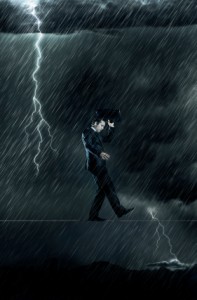 You’ve probably heard or even asked the question, “If God is so loving, then why does He allow bad things to happen to good people?”
You’ve probably heard or even asked the question, “If God is so loving, then why does He allow bad things to happen to good people?”
What if you learned that the events, emotions, and circumstances that we label as bad are one of the greatest gifts from God? How would that change your perspective and what difference would it make in your life?
Truth, or natural law, is what is. It is what functions in the world and it leads to satisfaction and contentment. Non-truth does not function; it always leads to some form of discontentment.
When you are violating a true principle, how does the Higher Power let you know? How can the Creator guide you to the true path of happiness?
Quite simply, we are shown the path through discontentment. Pain, rather than being a punishment, is actually loving guidance from an omniscient Creator showing us that what we’re doing isn’t working.
If the path we’re on leads to falling off a cliff of certain failure, wouldn’t it be loving for God to let us know before we fell off?
Discontentment is the way that the Higher Power gets our attention. It is our Creator telling us, “I love you way too much to let you go down this harmful path.”
It is the ensuing emotion a human being experiences when they’re violating truth. All it means is that we’re going the wrong way and we need to shift direction. When we understand this, we realize that discontentment in this moment is the seed of greatness in the next.
Pain vs. Suffering
Understand also that there is a difference between pain and suffering. Pain is an inescapable reality for all human beings; suffering comes from prolonging pain by misunderstanding its purpose.
Pain provides the context in which we find joy; without pain we have no way of feeling and appreciating pleasure. It is through overcoming opposition that we find meaning and fulfillment.
“That which we obtain too cheaply we esteem too lightly.” -Thomas Paine
Although we can never escape pain, suffering is a choice. Suffering comes from repeatedly ignoring the messages we receive from pain and continuously doing painful things.
Pain is temporary; suffering is protracted. Everyone stubs a toe occasionally; this is pain.
Suffering is to take that pain personally, try to blame others for putting things in our way, and to harbor anger over feeling the pain.
Pain comes from God gently showing us that we’re headed toward a cliff; suffering comes from receiving that message and then speeding up in the same direction.
When given the message of discontentment, ironically most people think that the answer is to work harder and faster, as opposed to shifting directions by working smarter.
People sit in traffic and feel frustrated and then somehow think that they can solve that frustration by increasing the frustration, honking the horn, and thinking bad thoughts about the drivers in front of them.
But the only way to solve such frustration is to peacefully surrender it to God and ask Him to show you the lesson.
For example, suppose you get caught in traffic because you left your house too late to get to work on time. The lesson in this case would be to leave the house earlier next time.
Getting mad and frustrated does nothing to solve the situation, yet it is the modus operandi of most people.
Many people stay in jobs that they dislike. They think the solution is to just wait it out until they can retire, rather than simply changing jobs.
Others constantly fight with their spouse with the incessant thought of, “If only he/she would change, then our relationship wouldn’t be so hard.”
But is it possible that the real solution is to change themselves? Are they listening to and understanding the messages they’re receiving from a loving God? Sadly, most people are not.
“Everyone thinks of changing the world, but no one thinks of changing himself.” -Leo Tolstoy
Beliefs vs. Truth
Much suffering arises because people don’t love themselves as much as they love their beliefs. Many people adopt beliefs like “I’m stupid” or “I’m ugly” or “I’m a failure,” despite the fact that they are powerful beings of infinite potential.
“I’m a failure” isn’t a truth—it’s merely a chosen belief. We adopt such beliefs through social programming, unhealthy relationships and interactions with others, and then we ingrain them into our psyche by continually running them through our minds.
A belief is an idea meant to create certainty. We choose our beliefs to make sense of the world and to feel secure. Ironically, most beliefs create far more uncertainty than anything else.
Interestingly, the ego-thinking human mind is Velcro for negativity and Teflon for positivity.
Suppose you go to a dinner party and have ten conversations. Nine out of the ten are amazing, uplifting conversations and the tenth is negative.
Which one are you going to remember? Which one are you going to rehash with your spouse after the party? Which one are you going to take personally and let it drain your energy?
Love and accept pain as the gift from God that it is and escape suffering by learning the right lessons from pain.
*********************************
 Steve D’Annunzio is the founder of the Soul Purpose Institute, the author of The Prosperity Paradigm, and a productivity trainer and life success coach to Fortune 100 executives, professional athletes, and high-performance entrepreneurs. For twenty years, he has been helping people identify their passion, develop it into a business idea, and deliver it to the world.
Steve D’Annunzio is the founder of the Soul Purpose Institute, the author of The Prosperity Paradigm, and a productivity trainer and life success coach to Fortune 100 executives, professional athletes, and high-performance entrepreneurs. For twenty years, he has been helping people identify their passion, develop it into a business idea, and deliver it to the world.
A member of the Transformational Leadership Council, Steve has shared the stage with world-changers like Dr. Deepak Chopra, Dr. Wayne Dyer, Marianne Williamson, Jack Canfield, and Barbra-Marx Hubbard.
He uses principles of higher awareness to inspire others to be far greater versions of themselves than they ever knew to be possible. By combining scientific and spiritual truth, he co-creates inner transformations for people to experience more outer prosperity in their life.
He is an author and composer of many books, paradigms, and artistic projects that have the common theme of alleviating human suffering and enhancing joy.
Steve lives with his family in Rochester, New York.






Speak Your Mind
You must be logged in to post a comment.